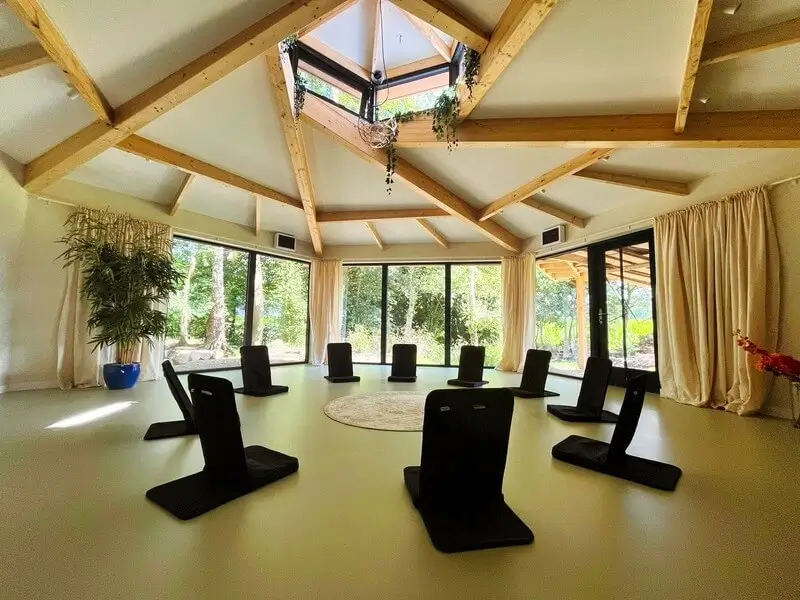The preparation for psychedelic retreats, like the ones we offer at Conscious Growth, is an act of commitment to oneself. It is an acknowledgment that true change requires intention and openness. Approaching the preparation phase in this way means that participants create a strong foundation for their psychedelic journey. By embarking on the personal transformation journey with clarity and purpose, participants open the door to profound, lasting changes that continue well beyond the retreat itself.
Preparation is a crucial component of any transformative experience. In the context of psilocybin retreats, where the focus is on conscious growth, intentional and thorough preparation is essential. A well-structured psychedelic preparation phase ensures participants are equipped to engage deeply and meaningfully with their inner journey, setting the stage for profound and lasting personal transformation, as research has indicated [1].
At Conscious Growth, we regard the preparation phase as an essential aspect of the psilocybin retreat programme. It ensures participants are mentally, emotionally and physically prepared to explore what emerges during their psychedelic journey, paving the way for longer-lasting, highly-significant change.
The Importance of Intention Setting During Psychedelic Preparation
Intentions shape our experiences by directing our attention to the outcomes we seek. In many traditional practices, intention setting is a critical part of medicine ceremonies, providing a framework for personal insight, healing or connection. In psychedelic retreats where the focus is conscious transformation, clarifying intentions enables participants to articulate how they hope the retreat will help them in their personal development and provide a focus for integrating the experience afterward [2].
Intentions are not rigid goals but flexible guides that help anchor the retreat experience by bringing a sense of purpose to it. Clarifying intentions helps participants approach their journeys with openness, enhancing the depth and relevance of what unfolds during the retreat. This inner disposition that is receptive to deep, meaningful experiences and insights leads to more profound, significant and lasting change.
Cultivating a Mindset of Openness and Curiosity
An open and curious mindset is key to preparation for a psilocybin retreat. It involves recognising and setting aside preconceived notions or rigid expectations about the psychedelic experience. By entering the journey with curiosity, participants can approach challenges with greater flexibility and be more open to the unknown as an opportunity for personal growth [3].
Cultivating openness does not mean disregarding discernment or caution. Instead, we invite participants to acknowledge the limits of their current understanding and to approach new perspectives and experiences with openness. During the psychedelic preparation sessions we offer as well as the first part of the psilocybin retreat, we support participants in addressing fears or resistance they might have, fostering a compassionate mindset that helps them remain centred and grounded, even when challenging emotions or situations arise.
Developing Mental and Emotional Readiness
Psychedelic preparation is also an opportunity for self-reflection and emotional exploration. Through the initial conversations we have with participants and the structured exercises during the psilocybin retreat, participants are encouraged to explore their internal state, recognising areas of strength and vulnerability. This process cultivates the mental clarity and emotional resilience needed to navigate the transformative aspects of a psychedelic experience, as has been highlighted by research [4].
Self-compassion plays a crucial role in the preparation phase of a psychedelic retreat. By encouraging kindness toward oneself, particularly when confronting insecurities or challenging emotions, participants establish a stable inner state for their psilocybin trip. This supports a more grounded journey especially when facing insecurities or intense emotions.
Physical Health as Part of Preparation for Psychedelic Retreats
Physical well-being is an integral component of the psychedelic preparation phase, as the body and mind are deeply interconnected and inseparable. Ensuring that one is in good physical health before the retreat enhances mental clarity and resilience – qualities that heighten the capacity to engage deeply with a psychedelic experience [5]. We invite participants to prepare for the retreat by adopting practices that support overall health, including balanced nutrition, regular exercise and adequate rest.
We also encourage participants to incorporate grounding practices like yoga, qi gong, mindful movement and breath-work into their routine in the weeks prior to the retreat. These activities not only enhance bodily awareness but also help participants build a sense of presence and stability that serves as an anchor during the psychedelic experience. This physical readiness supports participants in maintaining the energy and focus required for the retreat experience and helps them fully engage with their internal journey.
Cultivating Presence through Practice
During the preparation phase of our psilocybin retreats, we dedicate time to nurture a sense of presence that enables participants to stay fully engaged in the moment. By incorporating practices like meditation, mindfulness, breath-work, conscious movement and journalling, we help individuals develop a deeper level of self-awareness. This strengthens the ability to observe oneself without judgment, allowing for a fuller, more immersive psychedelic experience [6].
Enhancing the ability to engage with the present moment also encourages a state of receptivity, where participants are less likely to feel overwhelmed or distracted. This helps people navigate their experiences in a calmer, open and more grounded way, even when they encounter moments of discomfort or intensity. It also makes it easier to develop a stronger sense of acceptance and develop non-attachment to outcomes.
Learning to Let Go of Control
One of the most challenging aspects of a psychedelic journey is learning to let go of control and surrendering to whatever comes up during the experience. During the psychedelic preparation phase, we guide participants to explore where they might be holding on too tightly to control and encourage them to approach the psilocybin experience with greater openness.
Many participants find that letting go of control allows for a deeper sense of freedom and connection and that by embracing vulnerability they gain a more genuine sense of themselves and their emotional and relational patterns. This process is a crucial doorway to personal growth, as it encourages participants to engage with the experience of life in a more realistic and open way.
Building Community to Prepare for the Journey
Within the context of group psychedelic retreats, the preparation phase also consists of nurturing the community ties that will accompany each participant during the retreat. Establishing connections with others creates a sense of safety and trust, allowing participants to dive deeper into their psychedelic trip. It also generates a space of mutual support and exploration where participants feel that they are not alone in their journeys [7].
This sense of community that we start developing during the psychedelic preparation phase continues well into the retreat and extends beyond it. In this way, the intimate connections that are generated during the retreat experience can grow into highly-meaningful relationships that last over time.
Establishing Boundaries and Support Systems
Preparation for the psilocybin retreat also involves setting personal boundaries and establishing supportive structures that help one feel safe throughout the retreat programme. Participants may find it helpful to choose to communicate with some people they trust about the retreat experience, setting clear expectations around availability and the need for quiet time both before and after the retreat. Carefully choosing whom to talk to about the retreat is important as others’ attitudes towards psychedelics could influence one’s openness during the psychedelic trip and the ability to fully immerse oneself in the experience.
Having support systems in place – whether friends, family or mental health professionals – is also an important aspect of the psychedelic preparation phase. These provide participants with a holding environment they might need after the retreat. Together with personal boundaries, support networks enable people to navigate their psychedelic experiences with greater sense of confidence and security.
Looking Ahead: Preparing for Integration
The preparation phase of a psychedelic retreat is not only about getting ready for the retreat itself but also about planning for the integration process that follows and that enables participants to incorporate the retreat experience into daily life. By already having in mind the integration phase, participants gain a long-term vision of their personal growth, recognising that their journey is not confined to a single experience but is an ongoing process of self-discovery and personal development.
At Conscious Growth, we prioritise integration, offering individual and group sessions as part of our retreat programme to help participants process their experiences and find meaningful ways to carry their newfound perspectives forward. We also offer optional additional support for those who wish to continue furthering their personal development beyond the retreat programme itself.
Preparation: A Commitment to Conscious Growth
Preparation for the conscious transformation we aim at in our psilocybin retreats is an act of commitment to oneself. It is an acknowledgment that true change requires intention and openness. Approaching the psychedelic preparation phase in this way means that participants create a strong foundation for their psychedelic journey. By embarking on the personal transformation journey with clarity and purpose, participants open the door to profound, lasting changes that continue well beyond the retreat itself.

- Johnson, M. W., Richards, W. A., & Griffiths, R. R. (2008). Human hallucinogen research: Guidelines for safety. Journal of Psychopharmacology, 22(6), 603–620. https://doi.org/10.1177/0269881108093587
- Carhart-Harris, R. L., Roseman, L., et al. (2018). Psychedelics and consciousness. Current Biology, 28(17), R953–R955. https://doi.org/10.1016/j.cub.2018.07.050
- Grob, C. S., Danforth, A. L., et al. (2011). Pilot study of psilocybin treatment for anxiety in advanced-stage cancer patients. Archives of General Psychiatry, 68(1), 71–78. https://doi.org/10.1001/archgenpsychiatry.2010.116
- Griffiths, R. R., Richards, W. A., et al. (2006). Psilocybin can occasion mystical-type experiences having substantial and sustained personal meaning and spiritual significance. Psychopharmacology, 187(3), 268–283. https://doi.org/10.1007/s00213-006-0457-5
- Ross, S., Bossis, A., et al. (2016). Rapid and sustained symptom reduction following psilocybin treatment for anxiety and depression in patients with life-threatening cancer: A randomized controlled trial. Journal of Psychopharmacology, 30(12), 1165–1180. https://doi.org/10.1177/0269881116675512
- MacLean, K. A., Johnson, M. W., & Griffiths, R. R. (2011). Mystical experiences occasioned by the hallucinogen psilocybin lead to increases in the personality domain of openness. Journal of Psychopharmacology, 25(11), 1453–1461. https://doi.org/10.1177/0269881111420188
- Mithoefer, M. C., Grob, C. S., & Brewerton, T. D. (2016). Novel psychopharmacological therapies for psychiatric disorders: Psilocybin and MDMA. The Lancet Psychiatry, 3(5), 481–488. https://doi.org/10.1016/S2215-0366(15)00576-3

Psilocybin Retreat in the Netherlands
TAKE THE FIRST STEP
Get the monthly email with tools to help you live a more conscious life.
Just useful stuff – we promise!
Contact Us
Email: contact@consciousgrowth.eu
Legal Note
Taking psychedelic truffles in our retreats is subject to a registration process. Please consult the FAQs for a list of contraindications. Conscious Growth does not offer therapy or treatment for physical or mental health conditions during the retreats.
In accordance with Dutch law, we use exclusively psilocybin truffles that are legal across the country. You can read more about the legal aspect here.
APPLY for a Retreat
Book an Introductory Call
Our Retreats
Frequently Asked Questions
Resources
Terms and Conditions
Privacy Policy
